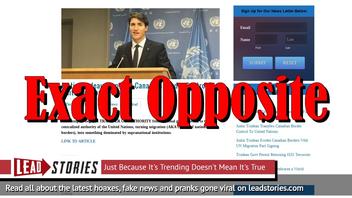
Did Canadian Prime Minister Justin Trudeau transfer Canadian border control to the United Nations by siging the "UN Global Compact On Migration"? No, that's not true: a summary of an article on the website of a tiny Canadian political party opened with a headline making that claim and it went quite viral but the actual text of the pact says the exact opposite.
The claim was made in a summary published on December 12, 2018 on the website of the (tiny) Cultural Action Party of Canada titled "Justin Trudeau Transfers Canadian Border Control To United Nations" (archived here) which read:
The Compact begins a TRANSFER OF AUTHORITY from national governments, to the centralized authority of the United Nations, turning migration (AKA control of national borders), into something dominated by supranational institutions.
Here is the article it links to:
Betrayal: Trudeau Government Signs UN Global Compact On Migration, Dealing A Devastating Blow To Canadian Sovereignty - Spencer Fernando
By signing the UN Global Compact, Trudeau is setting up a steady erosion of Canada's independence, taking power away from the Canadian People. The Trudeau government has betrayed the Canadian People by signing the UN Global Compact on Migration, dealing a severe blow to Canada's sovereignty.
Now let's compare that to what the pact actually says (you can read it in full here).
First of all, the document is not legally binding and it explicitly says it upholds the sovereignty of states:
This Global Compact presents a non-legally binding, cooperative framework that builds on the
commitments agreed upon by Member States in the New York Declaration for Refugees and
Migrants. It fosters international cooperation among all relevant actors on migration,
acknowledging that no State can address migration alone, and upholds the sovereignty of
States and their obligations under international law.
It explicitly mentions this also goes for border management policies:
27. We commit to manage our national borders in a coordinated manner, promoting bilateral and
regional cooperation, ensuring security for States, communities and migrants, and facilitating
safe and regular cross-border movements of people while preventing irregular migration. We
further commit to implement border management policies that respect national sovereignty, the
rule of law, obligations under international law, human rights of all migrants, regardless of their
migration status, and are non-discriminatory, gender-responsive and child-sensitive.
It also says migration policiy and determining migration status is something that is the right of sovereign states:
National sovereignty: The Global Compact reaffirms the sovereign right of States to determine
their national migration policy and their prerogative to govern migration within their jurisdiction,
in conformity with international law. Within their sovereign jurisdiction, States may distinguish
between regular and irregular migration status, including as they determine their legislative and
policy measures for the implementation of the Global Compact, taking into account different
national realities, policies, priorities and requirements for entry, residence and work, in
accordance with international law.
The references to international law are about things like freedom of speech, freedom of conscience, the right to life etc. that are part of general human rights agreed between countries. It just means you can't randomly shoot, forcibly convert, imprison or torture people at the border (or anywhere else, for that matter). But states are still free to decide who they let in (or not). Including Canada.
So the claim that the United Nations are now running Canadian border control is objectively not true. Canada is still able to decide who gets in or not (even though some people may not agree on the policy decided on by the Canadian government, but that is a different discussion).












